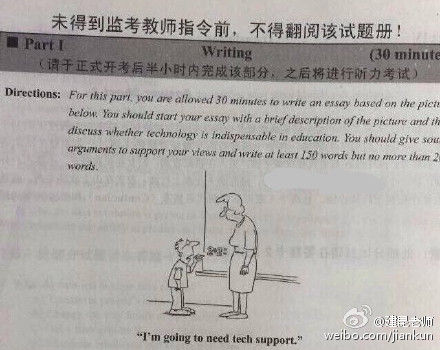chose
来源:英语六级 2016-04-19
(1) [chose]2015年12月英语六级真题及答案(长篇阅读)
Section B
First-Generation College-Goers: Unprepared and Behind
Kids who are the first in their families to brave the world of higher education come on campus with little academic know-how and are much more likely than their peers to drop out before graduation.
A) When Nijay Williams entered college last fall as a fires-generation student and Jamaican immigrant, he was academically unprepared for the rigors of higher education. Like many first-generation student, he enrolled in a medium-sized state university many of his high school peers were also attending, received a Pell Grant, and board and the closeness of the school to his family, he chose to live at home and worded between 30 and 40 hours a week while taking a full class schedule.
B) What Nijay didn"t realize about his school—Tennessee State University—was its frighteningly low graduation rate: a mere 29 percent for its first-generation students. At the end of his first year, Nijay lost his Pell Grant of over $5,000 after narrowly missing the 2.0 GPA cut-off, making it impossible for him to continue paying for school.
C) Nijay represents a large and growing group of Americans: first-generation college students who enter school unprepared or behind. To make matters worse, these schools are ill-equipped to graduate these students—young adults who face specific challenges and obstacles. They typically carry financial burdens that outweigh those of their peers, are more likely to work while attending school, and often require significant academic remediation(补习).
D) Matt Rubinoff directs I"m First, a nonprofit organization launched last October to reach out to this specific population of students. He hopes to distribute this information and help prospective college-goers find the best post-secondary fit. And while Rubinoff believes there are a good number of four-year schools that truly care about these students and set aside significant resources and programs for them, he says that number isn"t high enough.
E) "It"s not only the selective and elite institutions that provide those opportunities for a small subset of this population," Rubinoff said, adding that a majority of first-generation under graduates tend toward options such as online programs, two-year colleges, and commuter stand schools. "Unfortunately, there tends to be a lack of information and support to help students think bigger and broader."
F) Despite this problem, many students are still drawn to these institutions—and two-year schools in particular. As a former high school teacher, I saw students choose familiar, cheaper options year after year. Instead of skipping out on higher education altogether, they chose community colleges or state schools with low bars for admittance.
G) "They underestimate themselves when selecting a university," said Dave Jarrat, a marketing executive for Inside Track, a for-profit organization that specializes in coaching low-income students and supporting colleges in order to help students thrive. "The reality of it is that a lot of low-income kids could be going to elite universities on a full ride scholarship and don"t even realize it."
H) "Many students are coming from a situation where no one around them has the experience of successfully completing higher education, so they are coming in questioning themselves and their college worthiness," Jarrat continued. That helps explain why, as I"m First"s Rubinoff indicated, the schools to which these students end up resorting can end up being some of the poorest matches for them. The University of Tennessee and Tennessee State are worth comparing. Tennessee State"s overall graduation rate is a tiny 39 percent, but at least it has a smaller gap between the outcomes for first-generation students and those of their peers.
I) Still, the University of Tennessee deserves credit for being transparent. Many large institutions keep this kind of data secret—or at least make it incredibly difficult to find. The University of North Carolina at Chapel Hill, for instance, admits only that the graduation rate for its first-generation pupils is "much lower" than the percentage of all students who graduate within four years (81 percent).
J) It is actually quite difficult to find reliable statisties on the issue for many schools. Higher education institutions are, under federal law, required to report graduation rates, but these reports typically only include Pell recipient numbers—not necessarily rates specific to first-generation students. Other initiatives fail to break down the data, too. Imagine how intimidating it can be for prospective students unfamiliar with the complexities of higher education to navigate this kind of information and then identify which schools are the best fit.
K) It was this lack of information that prompted the launch of I"m First in 2013, originally as an arm of its umbrella organization, the Center For Student Opportunity. "If we can help to direct students to more of these types of campuses and help students to understand them to be realistic and accessible places, have them apply to these schools at greater frequency and ultimately get in and enroll, we are going to raise the success rate,"Rubinoff said, citing a variety of colleges ranging from large state institutions to smaller private schools.
L) Chelsea Jones, who now directs student programming at I"m First, was a first-generation college student at Howard. Like other student new to the intimidating higher-education world, she often struggled on her path to college. "There wasn"t really a college-bound culture at my high school," she said. "I want to go to college but I didn"t really know the process." Jones became involved with a college-access program through Princeton University in high school. Now she attributes much of her understanding of college to that:" But once I got to campus, it was a completely different ball game that no one really prepared me for."
M) She was fortunate, though. Howard, a well-regarded historically black college, had an array of resources for its first-generation students, including matching kids with counselors, connecting first-generation students to one another, and TRIO, a national program that supported 200 students on Howard"s campus. Still, Jones represents a small percentage of first-generation students who are able to gain entry into more elite universities, which are often known for robust financial aid packages and remarkably high graduation rates for first-generation students. (Harvard, for example, boasts a six-year graduation rate for underrepresented minority groups of 98 percent.)
N) Christian Vazquez, a first-generation Tale graduate, is another exception, his success story setting him far apart from students such as Nijay. "There is a lot of support at Yale, to an extent, after a while, there is too much support." he said, half-joking about the countless resources available at the school. Students are placed in small groups with counselors (trained seniors on campus); they have access to cultural and ethnic affinity(联系)groups, tutoring centers and also have a summer orientation specifically for first-generation students (the latter being one of the most common programs for students).
O) "Our support structure was more like:" You are going to get through Yale; you are going to do well."" he said, hinting at mentors(导师),staff, and professors who all provided significant support for students who lacked confidence about "belonging" at such a top institution.
46.
【题干】Many first-generation college-goers have doubts about their abilities to get a college degree.
【答案】H
【解析】H段第一句"Many students are coming from a situation where no one around them has the experience of successfully completing higher education, so they are coming in questioning themselves and their college worthiness,"
47.
【题干】First-generation college students tend to have much heavier financial burdens than their peers.
【答案】C
【解析】C段最后一句话They typically carry financial burdens that outweigh those of their peers, are more likely to work while attending school, and often require significant academic remediation(补习).
48.
【题干】The graduation rate of first-generation students at Nijay"s university was incredibly low.
【答案】B
【解析】B段第一句What Nijay didn"t realize about his school—Tennessee State University—was its frighteningly low graduation rate.
49.
【题干】Some top institutions like Yale seem to provide first-generation students with more support than they actually need.
【答案】N
【解析】"There is a lot of support at Yale, to an extent, after a while, there is too much support." he said, half-joking about the countless resources available at the school.
50.
【题干】On entering college, Nijay Williams had no idea how challenging college education was.
【答案】A
【解析】A段第一句When Nijay Williams entered college last fall as a fires-generation student and Jamaican immigrant, he was academically unprepared for the rigors of higher education.
51.
【题干】Many universities simply refuse to release their exact graduation rates for first-generation students.
【答案】J
【解析】J段第一句It is actually quite difficult to find reliable statistics on the issue for many schools.
52.
【题干】According to a marketing executive, many students from low-income families dot"s know they could have a chance of going to an elite university.
【答案】G
【解析】G段最后一句"The reality of it is that a lot of low-income kids could be going to elite universities on a full ride scholarship and don"t even realize it."
53.
【题干】Some elite university attach great importance to building up the first-generation students" self-confidence.
【答案】O
【解析】O段最后一句hinting at mentors(导师),staff, and professors who all provided significant support for students who lacked confidence about "belonging" at such a top institution.
54.
【题干】I"m First distributes information to help first-generation college-goers find schools that are most suitable for them.
【答案】D
【解析】D段第一句提到了First,随后He hopes to distribute this information and help prospective college-goers find the best post-secondary fit.也可以看出和题干匹配。
55.
【题干】Elite universities tend to graduate first-generation students at a higher rate.
【答案】M
【解析】M段倒数第二句Still, Jones represents a small percentage of first-generation students who are able to gain entry into more elite universities, which are often known for robust financial aid packages and remarkably high graduation rates for first-generation students.
(2) [chose]清明节的英语小故事:介子推
清明节的英语小故事:介子推
The Qingming Festival is popularly associated with Jie Zitui, who lived in Shanxi province in 600 B.C.
谈到清明节 ,有点历史知识的人,都会联想到历史人物介子推。
Legend has it that Jie saved his starving lord"s life by serving a piece of his own leg. When the lord succeeded in becoming the ruler of a small principality, he invited his faithful follower to join him.
据历史记载,在两千多年以前的春秋时代 ,晋国公子重耳逃亡在外,生活 艰苦 ,跟随他的介子推不惜从自己的腿上割下一块肉让他充饥。
However, Jie declined his invitation, preferring having a hermit"s life with his mother in the mountains.
后来,重耳回到晋国,作了国君(即晋文公,春秋五霸之一),大事封赏所有跟随他流亡在外的随从,惟独介子推拒绝接受封赏,他带了母亲隐居绵山。
Believing that he could force Jie out by burning the mountain, the lord ordered his men to set the forest on fire.
晋文公无计可施,只好放火烧山,他想,介子推孝顺 母亲,一定会带着老母出来。
To his consternation, Jie chose to remain in the mountain and was burnt to death. To commemorate Jie, the lord ordered all fires in every home to be put out on the anniversary of Jie"s death. Thus began the "cold food feast", a day when no food could be cooked since no fire could be lit.
谁知这场大火却把介子推母子烧死了。为了纪念介子推,晋文公下令每年的这一天,禁止生火,家家户户只能吃生冷的食物,这就是寒食节的来源。
The "cold food" festival occurs on the eve of the Qingming Festival and is often considered as part of it.
寒食节是在清明节的前一天,古人常把寒食节的活动延续到清明,久而久之,清明取代了寒食节。
As time passes, the Qingming Festival replaced the "cold food" festival.
拜介子推的习俗也变成了清明扫墓的习俗了。
Whatever practice is observed,the basic observation of Qing Ming is to remember one"s elders by making a special effort to visit their graves, ashes or ancestral tablets. To make the visit even more meaningful, some time should be spent to let young generation of family members know ancestors" past struggles and contributions, and the story of Jie Zitui who chose death over capitulation.
无论以何种形式纪念,为了使纪念祖先的仪式更有意义,我们应该让年轻一代的家庭成员了解先人过去的奋斗历史,当然,还要学习介子推宁死不屈的气节。
[清明节的英语小故事:介子推]相关文章:
1.清明节的小故事有哪些
2.清明节的由来小故事
3.清明的小故事
4.关于清明节的传说小故事
5.如何把清明改成小故事
6.清明英烈小故事
7.清明小故事推荐
8.传统佳节的小故事
9.清明节英烈小故事
10.清明节先烈小故事100字
-
 暑假趣事100字(共10篇)
暑假趣事100字(共10篇)
暑假趣事100字100字的,我的假期,是一盘丰富的糖果 我的假期,是一颗... 2018-09-25
-
 六级作文模板(共10篇)
六级作文模板(共10篇)
求大学六级的作文模板 一、说明原因型模块 Currently, XX has... 2018-09-16
-
六级作文万能模板(共10篇)
谁答的好 我追加20分 请给我一些英语六级作文能那高分的作文模板... 2018-06-18
-
协作的英语(共10篇)
英语,合作的英语单词有哪些?cooperate;collaborate;work togethe... 2018-04-06
-
 六级写作模板(共10篇)
六级写作模板(共10篇)
求大学六级的作文模板 一、说明原因型模块 Currently, XX has... 2017-11-27
-
 英语六级范文(共10篇)
英语六级范文(共10篇)
英语六级作文用不用写题目?为什么范文从来不给题目?有些是题目里自... 2017-10-04
-
 英语考级有哪些(共10篇)
英语考级有哪些(共10篇)
英语考级在哪考?考什么具体内容?报考大学英语四、六级的条件分两类... 2017-09-01
-
想学跳舞怎么自己练6篇
想学跳舞怎么自己练篇(一):学舞蹈的作文【篇一:学舞蹈】今天我很高... 2016-12-15
-
treasure是什么意思
第一篇treasure是什么意思:英语四六级翻译大作战翻译和作文在四六级... 2016-05-04
-
responsible
篇一:[responsible]聘书英文简短模板[自定义相关文章结束]篇二:[res... 2016-04-20
上一篇:happen
下一篇:responsible